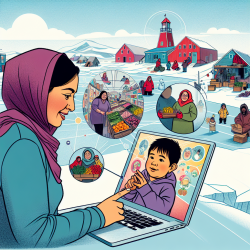Introduction
As a dedicated speech-language pathologist with a passion for creating positive outcomes for children, it is essential to continuously seek out innovative strategies and insights that can enhance our practice. The research article, The characteristics and experience of community food program users in arctic Canada: a case study from Iqaluit, Nunavut, provides valuable insights into community dynamics that can be applied to improve our therapeutic approaches.
Understanding Community Dynamics
The study conducted in Iqaluit, Nunavut, highlights the socio-economic challenges faced by community food program users. These challenges include high unemployment rates, low educational attainment, and food insecurity. As practitioners, understanding these dynamics is crucial as they can directly impact the communication development and overall well-being of children in these communities.
Data-Driven Insights for Practitioners
Data from the study reveals that users of community food programs are predominantly Inuit, unemployed, and have not completed high school. This demographic information is essential for tailoring speech-language pathology interventions that are culturally sensitive and contextually relevant. Here are some actionable insights for practitioners:
- Cultural Sensitivity: Incorporate culturally relevant materials and activities in therapy sessions to engage children effectively.
- Family Involvement: Encourage family participation in therapy to strengthen support networks and improve outcomes.
- Holistic Approach: Address socio-economic factors that may affect communication development, such as access to nutritious food and stable housing.
Encouraging Further Research
The study underscores the importance of understanding the broader socio-cultural context in which children develop. As practitioners, we should advocate for further research into how these factors influence communication development and seek collaborations with researchers to explore innovative solutions.
Conclusion
By integrating the insights from the Iqaluit study into our practice, we can enhance our ability to support children in achieving their communication goals. This research serves as a reminder of the importance of data-driven decisions and culturally sensitive approaches in speech-language pathology.
To read the original research paper, please follow this link: The characteristics and experience of community food program users in arctic Canada: a case study from Iqaluit, Nunavut.










